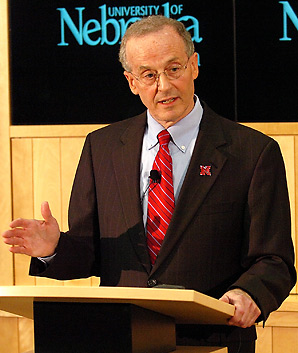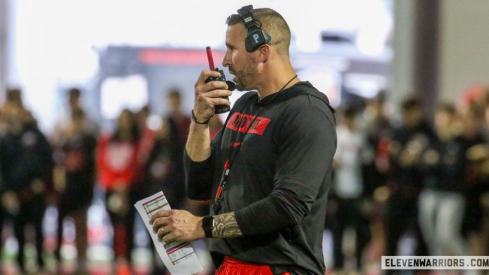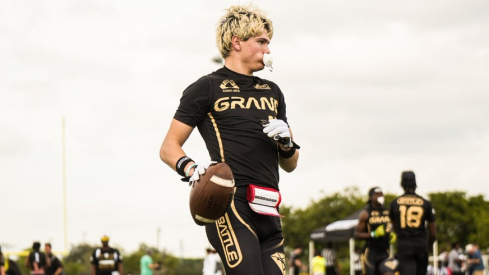 UNL's Harvey Perlman participated in the teleconference
UNL's Harvey Perlman participated in the teleconferenceIf Jim Delany and his Big Ten constituents have proven two things time and time again, it's that they're both adaptable and yet amazingly set in their ways at the same time. Consistency, thereby, has not been a strong suit. Monday's teleconference to discuss the B1G's stance on a prospective football playoff did nothing to quell these stereotypes.
Two months ago, they stirred the hornets nest when Delany said they favored a four-team playoff that included semifinals played on campus sites. Monday, Nebraska Chancellor Harvey Perlman doused the nest with pesticide by saying the first preference was to keep "the status quo," which meant the BCS and the same sleezy modus operandi it entails.
"If we were to vote today, we would vote for the status quo," Perlman noted.
The Big Ten position has evolved in two months from a four-team playoff on campus sites with conference champions to involving the Rose Bowl and existing bowls to suddenly favoring the status quo. This sudden evolution is perplexing, but it's more fascinating given Perlman's acknowledgment that despite these concerns, the Big Ten will acquiesce to an eventual playoff.
"We have tried to not put a stake in the ground and say, 'Over our dead bodies."
According to Perlman, if the BCS is changed, the second preference is for a plus-one model involving a championship after the bowls are played. If, reluctantly, a playoff is implemented, the preference is to include the bowls and use a selection committee to decide the four teams.
This is even more amazing, as it's yet another about-face by the Big Ten who has been staunchly in favor of conference champions being included.
"I totally agree we should have the four best teams," Delany added.
Delany, apparently, vehemently despises the method of selection to the BCS due to lack of transparency and subjectivity. That is yet another oddity considering the BCS -- the B1G's preference -- is built almost entirely on such principles.
Nonetheless, Delany expressed sheer bitterness toward the selection process.
“Everybody recognizes that the present poll system is not a good proxy,” he said. “It’s flawed, it’s not transparent, it has people who have a stake in the outcome voting, it measures teams before they play a game.”
These points are all ones that have been uttered by proponents of a playoff. Yet, instead of implementing a subjective system of selection, such as a human committee, the BCS formula could conceivably be tweaked to remove such bias. Nevermind the fact it should be easy to require transparency by simply forcing the computer models and voting results to be accountable.
The poll system is flawed for three reasons: selection bias, human bias and a simple lack of access. The coaches' poll comprises only 31 of 120 FBS coaches, which in itself means only a quarter of all coaches are able to impact the voting. To make matters worse, many of these coaches aren't even voting but rather having a staff member do it for them. Since most coaches are playing games on the same day as their peers, no coaches are qualified to vote on other teams to begin with.
To the extent coaches are able to cast a credible vote, however, it's strange that bias is removed from computers by tossing out the highest and lowest rankings for each team, yet the highest and lowest percentage of voters in the coaches and Harris polls are not adjusted for possible bias. Basically, the BCS in its infinite wisdom, has determined that algorithms are biased but humans are not.
All of these issues are merely cosmetic. They don't explain away why the Big Ten has completely changed its public stance. Many of these issues could be alleviated. The computer algorithms should be transparent. Even if the providers of computer polls don't want their proprietary formulas released to the public, they should be open weekly for inspection by BCS officials. The coaches should be dropped in favor of a large media panel from all over the country, or at least either all coaches or no coaches should vote.
Delany doesn't do well to explain how he's gone from conference champions to status quo or, at most, the 'four best teams.'
"I thought the combination of champions and an elite at-large team regardless of status—it could be a champion, could be an independent, could be a divisional runner-up or championship loser—was probably the right formulation. But that was just to get the discussion going."
Just another in a long line of inconsistency from the Big Ten. It's predictable as the day is long.
By virtue of the Big Ten meetings last week, Delany and other conference commissioners will meet beginning next week to hash out a single proposal. Once the commissioners find a middle ground, a plan will be presented for university presidents to vote on late this month or early next month. Perhaps Monday's public comments by the league is just posturing or perhaps it's their true pecking order. But unless they've truly done a 180 in the past two months, everything they say going forward has been mitigated because of the stark inconsistency.
But hey, at least they're adaptable.

